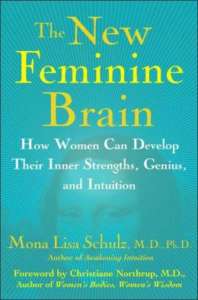

When seeing a reference to Mona Lisa, anyone who is familiar with Christiane Northrup’s groundbreaking work in women’s health may think not of da Vinci but of Mona Lisa Schulz, the neuropsychiatrist and medical intuitive. Her name is sprinkled throughout Dr. Northrup’s books.
The New Feminine Brain: How Women Can Develop Their Inner Strengths, Genius, and Intuition is one of Dr. Mona Lisa’s four books. In it she talks about how femaleness is wired into the brain and how we can benefit by better understanding our brains, bodies, and emotions. Her message is that we are what we feel, and the emotions we experience are the best predictors of our happiness and health.
Women have more connections than men do between the right and left brain, allowing us to divide our attention more successfully. But at a cost. The resultant stress actually changes the brain and triggers symptoms in the body. Not only do women have far more problems with depression, anxiety, fears, attention, and memory than men do, but we have far more such problems than women did just a few generations ago.
This is not your grandmother’s brain.
“There is no longer a traditional female brain,” Dr. Mona Lisa writes. The world has molded and remolded it, and the female brain has responded by rewiring itself again and again. Our perception, attention, and memory circuits have been affected by the constant and varying input of our day. The endless stream of cell phones, newsfeeds, texts, and emails has made life even more challenging for those who tend toward moodiness or obsession/compulsion. And when your brain holds on to an emotion long enough, it molds to it. A depressed person’s brain, for example, lays down pathways that make the person expect less and less. Over time, optimistic synapses actually get erased and rewired with pessimistic ones.
What can we do about all this bad news? Learn how your particular brain is wired. Do you know how to use it for:
- Building self-esteem? (Or do you feel crushed by your responsibilities?)
- Feeling rewarded? (Or is nothing you do ever good enough?)
- Keeping your relationships healthy and manageable? (Or do you feel things so intensely that it hurts?)
- And the Big One: intuition? (Or is it too hard to make decisions when, as is often the case, you don’t have all the information you need?)
The New Feminine Brain is still working out the kinks. The world’s changing demands have forced it to sprout new pathways to accommodate the more traditionally male, compartmentalized brain style we often need now. And the female brain, with its generous connection between right and left halves, makes us “porous” to other people’s feelings. This can overload it, triggering the release of biochemicals that hurtle us into emotional imbalance. Just as we each have our threshold for physical pain, we have one for emotional pain, too. And when we reach it, when unexpressed or overtaxed emotions can’t take one more hit, our brains’ circuits are disrupted. We then feel overwhelmed, depressed, anxious, unable to cope. Sound familiar?
One solution is to do what women are famous for doing, much to the dismay of the men in our lives: talking about our feelings. But here is the genius behind that instinct (Gentlemen, take note): When you talk about a feeling, when you name a feeling, you are sending the emotion of the right brain into the more logical/analytical left brain, where it can get released. And if that doesn’t happen? Then it gets released instead into your body and manifests as illness. From digestive difficulties to fatigue, from heart and thyroid problems to dementia, our bodies will make our unexpressed emotions come through loud and clear. But (Ladies, take note) we shouldn’t overdo talking about emotions, either.
Dr. Mona Lisa instead urges us to work on our “emotional feng shui.” That means
- Having a balanced diet of the five emotions (fear, anger, sadness, joy, and love)
- Being able to delay talking about feelings when necessary
- Being able to experience an emotion fully, comprehend its message, respond appropriately, and then move on
- Being able to express an emotion with appropriate volume and intensity, depending on your surroundings
- Being able to express your feelings to the right person at the right time
Not so simple, when you think of how easily our emotions can masquerade as one another. Dr. Mona Lisa gives a wonderful example in one of her many amusing song references. Patsy Cline may have seemed sad, but she was really mad (I’m crazy for loving you…). Janis Joplin sounded mad, but she was really sad (Take another little piece of my heart…). She also points out that women sometimes cry when angry; have you ever seen a man do that?
In practice, the directives in this list would constitute a sophisticated emotional intelligence that could translate into the perfect mind/body balance. Having difficulty with any of them, Dr. Mona Lisa explains, may predispose a woman to depression, anxiety, attention issues, and memory problems—the default modes when we can’t achieve this balance. She shares an anecdote that makes this apparent:
When I first set foot on a psychiatric unit as a medical student, I noticed that most of the patients were depressed women. This made no sense to me, so I asked a psych nurse, “Where are all the men?” and he answered, “All the women are here; all the men are in jail. Women turn their anger inward and it becomes depression. Men turn their anger outward, into violence; they get in trouble with the law and end up in jail.” Anger and sadness are related, which sets the scene for the New Feminine Brain’s challenge with mood, depression, anger, and irritability.
Much else is covered in this extraordinary book, but for me the takeaway is the delicate and difficult goal of properly identifying our emotions. You may feel you have hundreds, but they boil down to only five: fear, anger, sadness, joy, and love. There are mood apps and charts to help you start thinking in these terms. Get in the habit of saying to yourself or someone else, “I’m feeling more sad than angry right now” or “I’m experiencing a lot of anxiety. This is fear.”
It might be harder than rearranging your furniture, but balancing your emotional feng shui just may save you from disease and despair. The New Feminine Brain will show you how.




2 Comments
Ann H.
Seems like a great read, I will definitely pick it up. Thanks so much for sharing.
Sandra Mann
As I read through this article, I can’t help but to drop my jaw every few sentences ( this is ME)! It’s so relatable to what’s going on in my life right now. I will surely pick up a copy as soon as I can. I feel that it will be a tremendous help in my life.
Thank you Rewire Me!